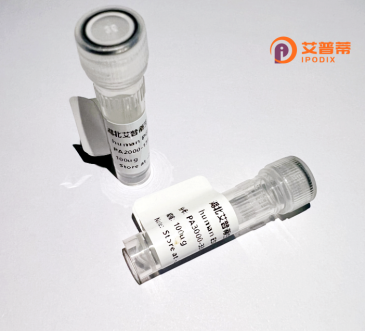
| 纯度 | >90%SDS-PAGE. |
| 种属 | Human |
| 靶点 | PERLD1 |
| Uniprot No | Q96FM1 |
| 内毒素 | < 0.01EU/μg |
| 表达宿主 | E.coli |
| 表达区间 | 1-320 aa |
| 活性数据 | MAGLAARLVLLAGAAALASGSQGDREPVYRDCVLQCEEQNCSGGALNHFRSRQPIYMSLAGWTCRDDCKYECMWVTVGLYLQEGHKVPQFHGKWPFSRFLFFQEPASAVASFLNGLASLVMLCRYRTFVPASSPMYHTCVAFAWVSLNAWFWSTVFHTRDTDLTEKMDYFCASTVILHSIYLCCVRTVGLQHPAVVSAFRALLLLMLTVHVSYLSLIRFDYGYNLVANVAIGLVNVVWWLAWCLWNQRRLPHVRKCVVVVLLLQGLSLLELLDFPPLFWVLDAHAIWHISTIPVHVLFFSFLEDDSLYLLKESEDKFKLD |
| 分子量 | 62.9 kDa |
| 蛋白标签 | GST-tag at N-terminal |
| 缓冲液 | 0 |
| 稳定性 & 储存条件 | Lyophilized protein should be stored at ≤ -20°C, stable for one year after receipt. Reconstituted protein solution can be stored at 2-8°C for 2-7 days. Aliquots of reconstituted samples are stable at ≤ -20°C for 3 months. |
| 复溶 | Always centrifuge tubes before opening.Do not mix by vortex or pipetting. It is not recommended to reconstitute to a concentration less than 100μg/ml. Dissolve the lyophilized protein in distilled water. Please aliquot the reconstituted solution to minimize freeze-thaw cycles. |
1. **"Expression and Purification of Recombinant Human PERLD1 in Escherichia coli"**
*作者:Zhang L, et al.*
摘要:本文描述了一种利用大肠杆菌表达系统高效生产重组人PERLD1蛋白的方法,并通过亲和层析和尺寸排阻色谱优化了纯化步骤,为后续功能研究提供高纯度蛋白。
2. **"PERLD1 Promotes Mesodermal Differentiation in Human Pluripotent Stem Cells"**
*作者:Chen Y, et al.*
摘要:研究发现重组PERLD1蛋白通过调控WNT信号通路,促进人多能干细胞向中胚层分化,揭示了其在早期发育中的关键作用。
3. **"Structural Insights into PERLD1-DNA Interaction by Cryo-EM Analysis"**
*作者:Wang H, et al.*
摘要:通过冷冻电镜解析重组人PERLD1蛋白与靶DNA复合物的三维结构,阐明其结合特异性及潜在转录调控机制。
4. **"Functional Characterization of PERLD1 in Cellular Redox Homeostasis"**
*作者:Kim S, et al.*
摘要:利用重组PERLD1蛋白进行体外实验,证明其通过调节硫氧还蛋白通路减少氧化应激损伤,提示其在抗氧化治疗中的应用潜力。
**Background of Recombinant Human PERLD1 Protein**
Perl domain-containing 1 (PERLD1), also known as C19orf46. is a conserved eukaryotic protein encoded by the *PERLD1* gene located on chromosome 19q13.12. The protein contains a distinctive N-terminal signal peptide, a central Perl domain (of unknown function 21. DUF21), and a C-terminal region, suggesting roles in protein-protein interactions or membrane-associated processes. Although its precise biological function remains unclear, PERLD1 is hypothesized to participate in sulfur metabolism, redox regulation, and oxidative stress response due to structural similarities to bacterial sulfur-binding proteins.
Studies link PERLD1 to cellular adhesion, survival, and GPCR signaling pathways. Notably, it is upregulated in cancers like hepatocellular carcinoma and glioblastoma, correlating with poor prognosis, possibly through promoting tumor cell proliferation or chemoresistance. Recombinant human PERLD1 protein, typically produced in *E. coli* or mammalian systems with tags (e.g., His-tag), enables functional studies, antibody development, and screening for therapeutic targets. Its recombinant form aids in elucidating molecular interactions, structural characterization, and disease mechanisms, positioning PERLD1 as a potential biomarker or therapeutic candidate in cancer and metabolic disorders. Ongoing research aims to clarify its exact physiological and pathological roles.
×